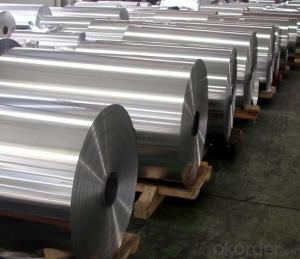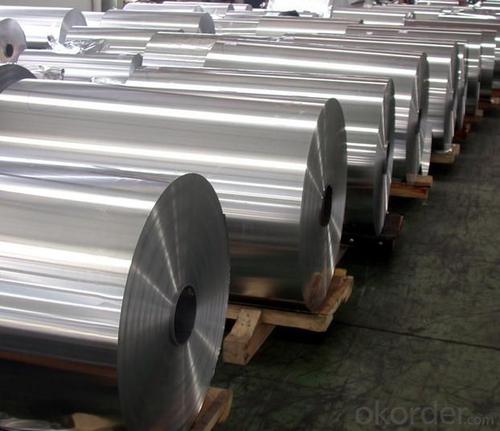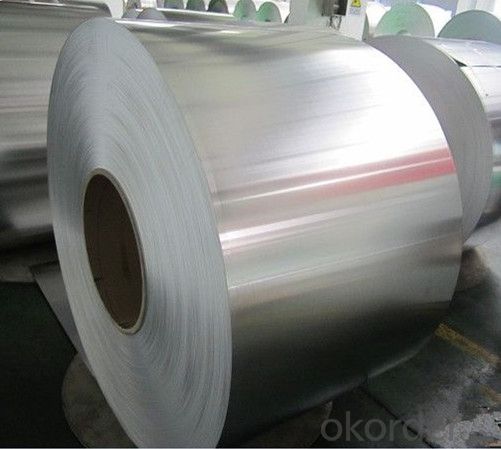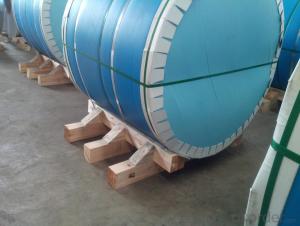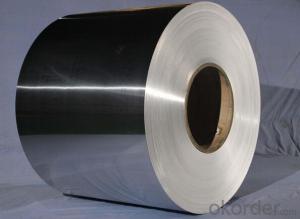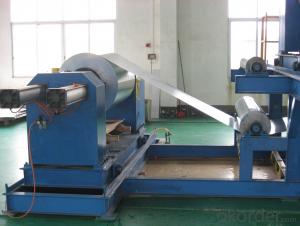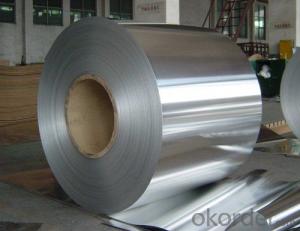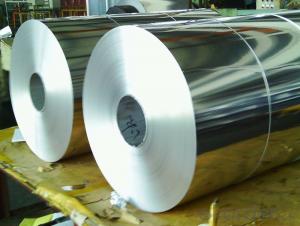Aluminum Coil 5052 Price 3003 Alloy H22 Aluminum Rolled Sheet Aluminium Coil
- Loading Port:
- Shanghai
- Payment Terms:
- TT OR LC
- Min Order Qty:
- 5 m.t.
- Supply Capability:
- 500 m.t./month
OKorder Service Pledge
OKorder Financial Service
You Might Also Like
Specification
3003 H22 Aluminum Rolled Sheet Aluminium Coil
aluminum coil specifications:
1) Alloy :1050, 1060,1100, 3003 3004 3105 3A21 5005 5052 etc
2) Temper: O/H12/H14/H1/H18/H32/H34/H36/H38//H111/H112/H116/H321/T6/T651/T3/T351 etc
3) Thickness: 0.1mm to 6mm
4) Width:20mm to 3300mm
5)Coil weight: 100kgs to 6 tons depends on actual requirement
6)Core material: Aluminum or paper
7)Coil Inner diameter: 75mm, 150mm, 200mm, 300mm, 405mm, 505mm or as required
8) Protective film can be added
item | 3003 Aluminum coil | |
Standard | GB/T3190-2008,GB/T3880-2006,ASTM B209,JIS H4000-2006,etc | |
Material | 1060,1050,1100 3003,3103,3004,3005,3105 5052, 5454,5754 | |
Size | Thickness | 0.5mm-3.5mm |
Width | 800-1500mm | |
Weight/Roll | About 1.5MT/3MT | |
Quality control | Mill Test Certificate is supplied with shipment, Third Part Inspection is acceptable. | |
Surface | Bright, polished, hair line, brush, checkered, embossed, etc | |
Trade terms | Price term | ,FOB, CNF, CIF, etc |
Payment Term | TT,L/C | |
MOQ | 2MT | |
20 GP Capacity | About 20-25MT | |
Delivery time | 1.The products will delivery immediately after receiving the payment. 2.According to the order quantity, prompt delivery. | |
Export to | Ireland,Singapore,Indonesia,Ukraine,Spain,Canada,USA,Brazil,Thailand,Korea,Iran,India,Egypt,Kuwait, Oman,Viet Nam, South Africa, Dubai, Russia, etc | |
Package | Stick blue film→plastic film→waterproof paper→1~2 tons on a export standard pallet(corner protection) | |
Application | 1)Further making utensil.2)Solar reflective film3)The appearance of the building4)Interior decorating:ceilings,walls,etc.5)Furniture cabinets6)Elevator decoraction7)Signs,nameplate,bags making.8)Decoration inside and outside the car9)Household appliances:refrigerators,microwave ovens,audio equipment,etc.10)The consumer electronics:mobile phones,digital cameras,MP3,etc. | |
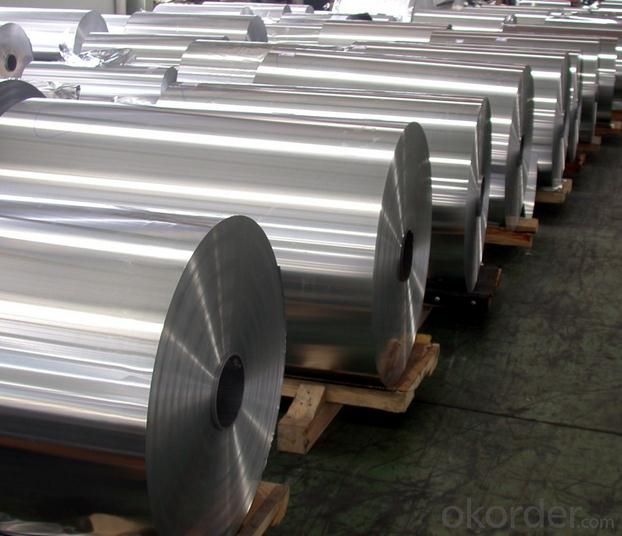
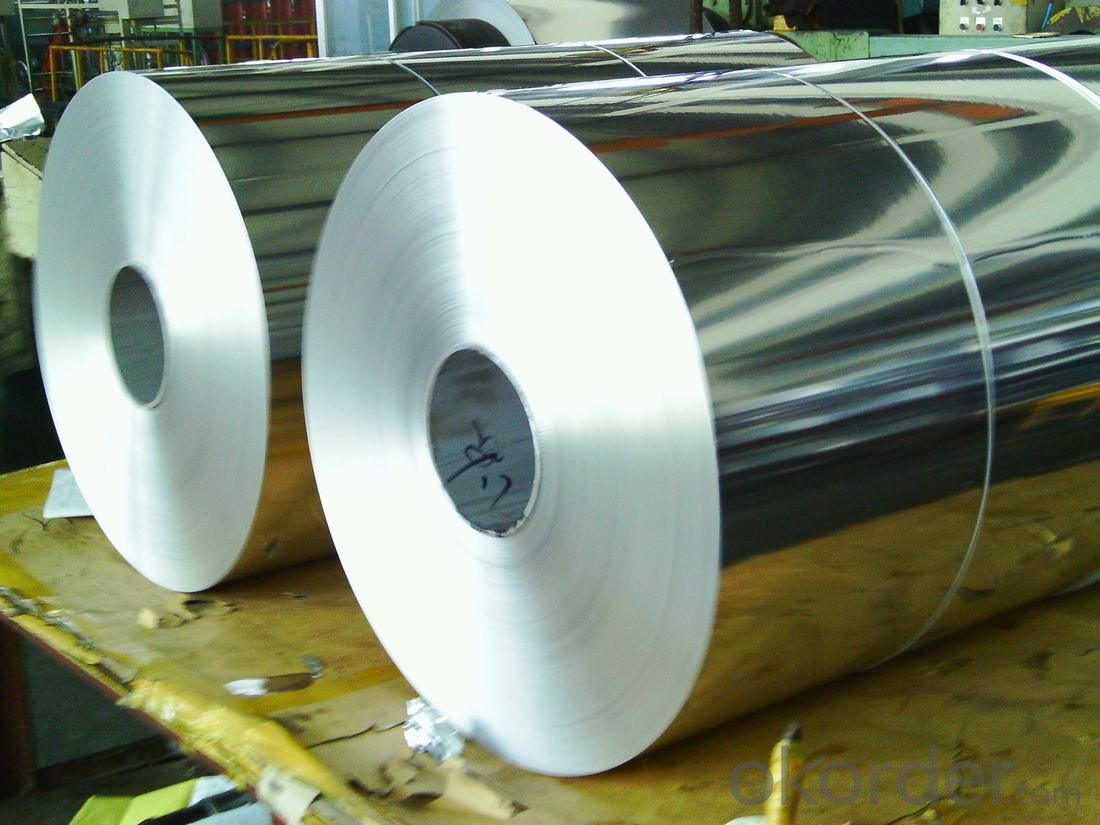
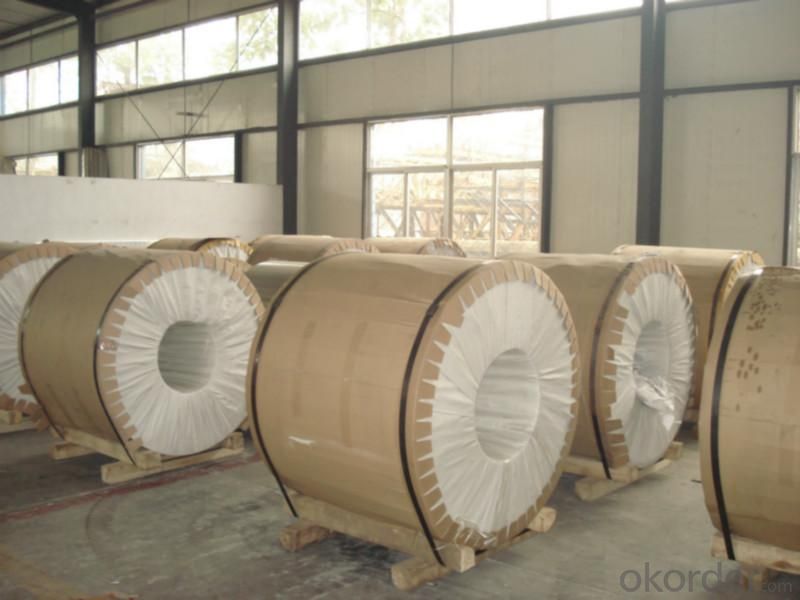
- Q: Can aluminum coils be used in electrical applications?
- Yes, aluminum coils can be used in electrical applications. Aluminum is often used as a conductor in electrical wiring due to its high conductivity and low cost compared to copper. Aluminum coils are commonly used in transformers, motors, generators, and other electrical equipment. However, it is important to note that aluminum has a lower electrical conductivity than copper, so larger aluminum coils may be required to achieve the same level of conductivity. Additionally, aluminum coils may require special insulation and connectors to prevent corrosion and ensure proper electrical connections.
- Q: What are the width tolerances for aluminum coils?
- The width tolerances for aluminum coils can vary depending on the specific application and industry standards. However, in general, the standard width tolerances for aluminum coils typically range between +/- 0.005 inches to +/- 0.020 inches. These tolerances ensure that the width of the aluminum coil falls within an acceptable range and meets the required dimensions for the intended use. It is worth noting that tighter tolerances may be achievable depending on the specific manufacturing processes and equipment capabilities. Therefore, it is essential to consult the appropriate industry standards and specifications to determine the exact width tolerances required for a particular application.
- Q: How are aluminum coils protected against UV exposure during storage?
- Aluminum coils are typically protected against UV exposure during storage by being covered with a protective layer or coating. This layer acts as a barrier, preventing direct contact between the coils and UV rays from the sun. Additionally, storing the coils in a shaded area or inside a warehouse can further minimize their exposure to harmful UV radiation.
- Q: Can aluminum coils be used in marine environments?
- Yes, aluminum coils can be used in marine environments. Aluminum is widely used in marine applications due to its excellent corrosion resistance properties. It forms a protective oxide layer that prevents further oxidation and corrosion, making it suitable for various marine equipment and structures.
- Q: How are aluminum coils used in the production of electronic devices?
- Aluminum coils play a crucial role in the production of electronic devices. They are commonly used as the primary material for manufacturing the internal components of electronic devices such as transformers, inductors, and electromagnets. These coils are made by winding aluminum wire around a core, creating a compact and efficient conductor for electrical currents. In transformers, aluminum coils are utilized to transfer electrical energy between two or more circuits. These coils enable voltage transformation by utilizing electromagnetic induction, where a varying current in one coil induces a voltage in another coil. This process is vital in stepping up or stepping down voltage levels, allowing efficient power distribution in electronic devices and electrical systems. Inductors, another essential component in electronic devices, are made using aluminum coils. An inductor resists changes in electrical current and stores energy in its magnetic field. Aluminum coils provide low resistance, high conductivity, and can handle high-frequency currents, making them ideal for inductor applications. They are used in various electronic devices such as power supplies, speakers, and filters to control current flow and regulate voltage. Additionally, aluminum coils are employed in the production of electromagnets, which are widely used in electronic devices. Electromagnets are created by passing an electric current through a coil to generate a magnetic field. Aluminum coils are preferred due to their lightweight nature and good thermal conductivity, allowing efficient heat dissipation in high-power applications. Furthermore, the use of aluminum coils in electronic devices offers advantages such as cost-effectiveness, lightweight construction, and excellent electromagnetic properties. The lightweight nature of aluminum enables the production of compact and portable electronic devices, making them more convenient for users. Moreover, aluminum's high thermal conductivity ensures efficient heat dissipation, which is crucial for preventing overheating and maintaining the proper functioning of electronic devices. In conclusion, aluminum coils are extensively used in the production of electronic devices for various applications such as transformers, inductors, and electromagnets. Their excellent electrical conductivity, lightweight construction, and thermal conductivity make them an ideal choice for efficient and reliable performance in electronic devices.
- Q: Are aluminum coils suitable for low-maintenance roofing applications?
- Indeed, low-maintenance roofing applications can benefit from the suitability of aluminum coils. Renowned for its durability, longevity, and corrosion resistance, aluminum proves to be an ideal roofing material. Despite its lightweight nature, aluminum coils possess remarkable strength that ensures superior structural integrity, enabling them to endure diverse weather conditions. Moreover, aluminum's low-maintenance characteristics make it a standout choice. It does not rust and does not necessitate regular painting, allowing homeowners and building managers to save valuable time and money that would otherwise be spent on maintenance tasks such as repainting or replacing rusted components. Ultimately, aluminum coils serve as an outstanding option for low-maintenance roofing applications.
- Q: How do aluminum coils perform under low-temperature applications?
- Aluminum coils are known for performing exceptionally well under low-temperature applications. Due to its inherent properties, aluminum is highly resistant to low temperatures and can maintain its structural integrity even in extreme cold conditions. The low thermal expansion coefficient of aluminum allows it to contract and expand without compromising its performance, making it an ideal choice for various low-temperature applications. One of the key advantages of aluminum coils in low-temperature applications is their ability to resist corrosion. Aluminum naturally forms a protective oxide layer that prevents it from rusting or corroding, even in cold and wet environments. This makes aluminum coils highly durable and ensures their longevity, even when exposed to low temperatures for extended periods. Additionally, aluminum has excellent thermal conductivity, which means it effectively transfers heat even at low temperatures. This property is crucial in applications such as refrigeration and air conditioning, where efficient heat transfer is required to maintain the desired temperature levels. Aluminum coils can effectively dissipate heat, ensuring optimal performance in low-temperature environments. Furthermore, aluminum coils are lightweight, which makes them easier to handle and install in low-temperature applications. Their lightweight nature also contributes to energy efficiency, as less energy is required to transport and operate the equipment using aluminum coils. In summary, aluminum coils perform exceptionally well under low-temperature applications. Their resistance to corrosion, thermal conductivity, durability, and lightweight nature make them an ideal choice for various industries, including refrigeration, air conditioning, and low-temperature processing.
- Q: This question asks about the applications of aluminum coil in the field of architecture.
- <p>Aluminum coil is widely used in architecture for various purposes. It is utilized in the manufacturing of aluminum composite panels, which are lightweight, durable, and have excellent weather resistance, making them ideal for facades and exterior cladding. Aluminum coil is also used in the production of roofing materials and rainwater systems due to its corrosion resistance and strength. In addition, it is employed in the creation of window frames and doors for its thermal insulation properties and aesthetic appeal. Furthermore, aluminum coil is used in the construction of structural components such as beams and columns, taking advantage of its high strength-to-weight ratio and recyclability. Its versatility and sustainability make aluminum coil a popular choice in modern architectural design.</p>
- Q: Are aluminum coils suitable for signage and advertising applications?
- Yes, aluminum coils are suitable for signage and advertising applications. Aluminum is a highly versatile material that offers several advantages for these purposes. First, aluminum is lightweight, making it easy to handle and install. This is especially beneficial for large-scale signage or advertising displays. Second, aluminum is highly durable and resistant to corrosion, ensuring that the signage or advertising materials will withstand the elements and maintain their appearance over time. Additionally, aluminum can be easily fabricated and customized to meet specific design requirements, allowing for creativity and flexibility in signage and advertising applications. Moreover, aluminum is a sustainable material that is recyclable, making it an environmentally friendly choice for signage and advertising projects. Overall, the characteristics of aluminum coils make them an ideal option for signage and advertising applications.
- Q: I have a mig welder, and I would like to learn to weld aluminum. I have been told that I must buy an aluminum wire spool gun, because the standard mig wire feeder gun will not work with aluminum wire. I don't understand why my standard wire feeder will not work. It feeds wire just like a spool gun. Why do I need to spend money on a spool gun just to weld aluminum? If a spool gun is truly necessary, where can i find one for a reasonable price? Thanks for your help!
- This Site Might Help You. RE: Is an aluminum wire spool gun really necessary to weld aluminum with my Mig welder? I have a mig welder, and I would like to learn to weld aluminum. I have been told that I must buy an aluminum wire spool gun, because the standard mig wire feeder gun will not work with aluminum wire. I don't understand why my standard wire feeder will not work. It feeds wire just like a...
Send your message to us
Aluminum Coil 5052 Price 3003 Alloy H22 Aluminum Rolled Sheet Aluminium Coil
- Loading Port:
- Shanghai
- Payment Terms:
- TT OR LC
- Min Order Qty:
- 5 m.t.
- Supply Capability:
- 500 m.t./month
OKorder Service Pledge
OKorder Financial Service
Similar products
Hot products
Hot Searches
Related keywords
